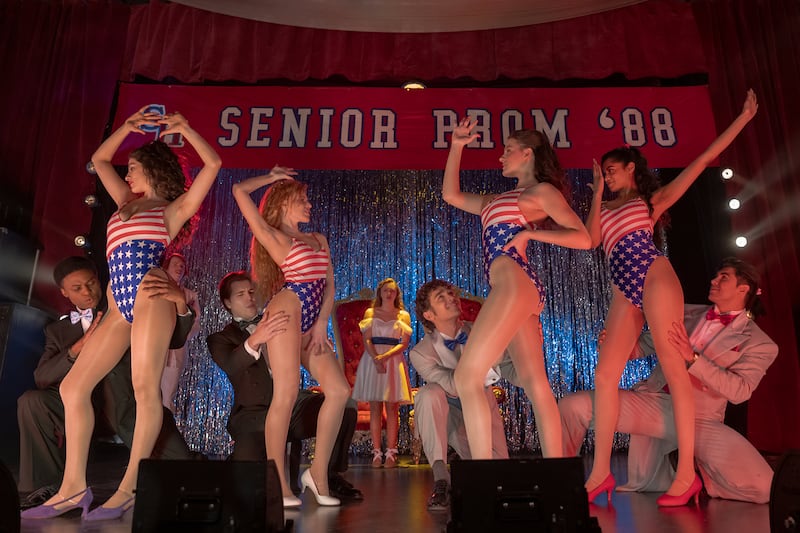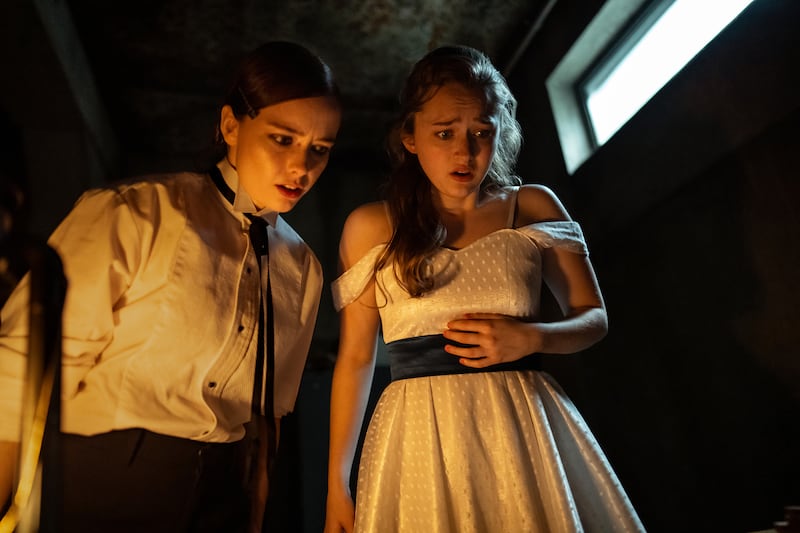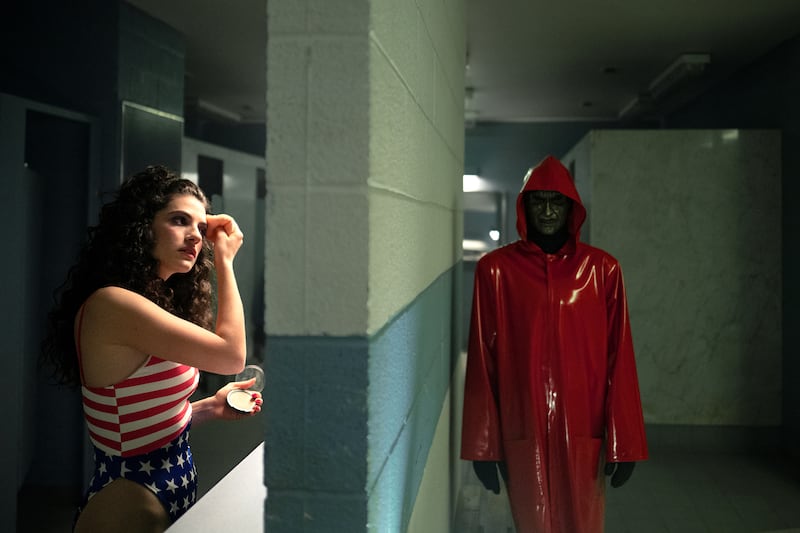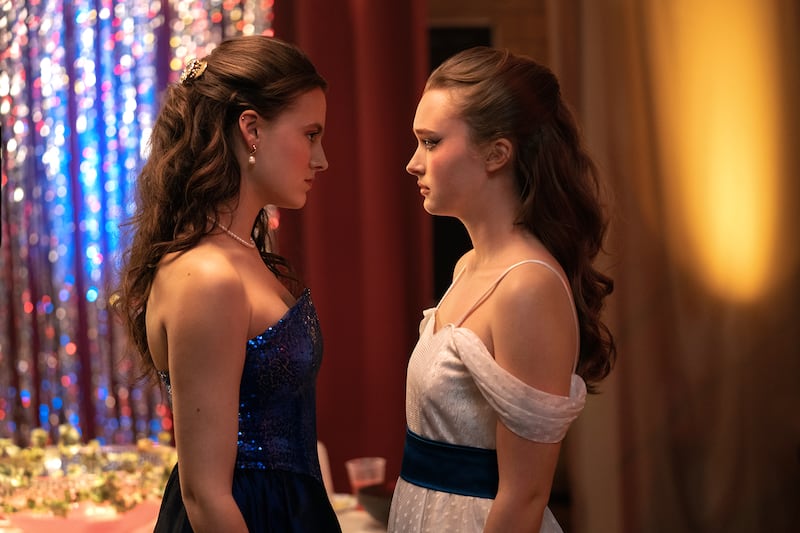Netflix’s gimmicky Fear Street trilogy was a minor sensation when it debuted in the summer of 2021, but its cultural footprint is zero because the films were, in the final tally, hackneyed rehashes that neither scared nor amused.
Four years later, the streamer attempts to resurrect the brand (based on R.L. Stine‘s novels) with Fear Street: Prom Queen, a stand-alone feature premiering May 23 that mimics and remixes innumerable superior efforts to fatally formulaic ends. Cartoonishly gory and drearily unoriginal and predictable, it’s a collection of tired devices and shout-outs that plays like training wheels slasher cinema.
Taking place, like its predecessors, in the hard-luck town of Shadyside, where murderous tragedy is a constant, and where everyone lives in the shadow of wealthy neighboring Sunnydale, Fear Street: Prom Queen is set in a Stranger Things version of 1988 awash in every decade-specific cliché imaginable.
It’s a vision modeled on previous period-piece movies about the era rather than the real thing, and that artificiality extends to its by-the-books horror narrative, whose prime focus is Lori (India Fowler). An outcast because her mom is thought to have murdered her dad back in high school (while she was still in the womb), Lori is now determined to win the title of prom queen. Unfortunately, she has stiff competition from rebellious weed-dealer Christy (Ariana Greenblatt)—who’s a preposterous candidate, given her non-conforming bad-girl reputation—and b—hy popular girl Tiffany (Fina Strazza) and her “wolfpack” acolytes Melissa (Ella Rubin), Linda (Ilan O’Driscoll), and Debbie (Rebecca Ablack).

Shadyside takes its prom queen contest absurdly seriously, to the point that it’s all anyone talks about. Vice Principal Brekenridge (Lili Taylor)—who used to work at a Catholic school and now runs the show alongside weak-willed principal Wayland (Darrin Baker)—has them practice ahead of time for the upcoming ceremony. Lori is the clear underdog in this race, and she’s mocked as the offspring of a killer by Tiffany, whether they’re in class or at the diner where Lori works.
Tiffany believes her teacher father Dan (Chris Klein) and mother Nancy (Katherine Waterston) when they tell her she’s “special,” and she spends the entirety of the film acting like an arrogant, scheming caricature. Lori is her polar opposite, a good girl with chaste romantic interest in Tiffany’s boyfriend Tyler (David Iacono), who seems to be into her, thus amplifying tension between the girls.

Lori’s best friend Megan (Suzanna Son) is a lesbian-coded Fangoria reader (with a poster of Lucio Fulci’s Zombie on her bedroom wall) who pulls monster movie pranks on her classmates, thereby providing Fear Street: Prom Queen with early fake-out gruesomeness. Genuine bloodshed comes courtesy of a fiend whose attire—a yellow rain slicker and a spooky mask—suggests he’s a big fan of I Know What You Did Last Summer.
This enigmatic assassin begins by offing Christy in a scene whose staging is almost impressively lethargic. Afterwards, he crosses out her picture on the yearbook page for prom queen candidates, indicating that his real aim is throwing the pageant for his preferred entrant—or, perhaps, simply ruining the competition because of some long-held grudge.

Fear Street: Prom Queen exists in a silly throwback fantasyland and it can’t stop reminding its audience that it knows the ’80s, whether via a soundtrack of notable hits (“White Wedding,” “U Got the Look,” “Sweet Dreams (Are Made of This)”), posters of Johnny Depp and Patrick Swayze, or a story indebted to, among others, Prom Night and April Fool’s Day.
As such, it operates on the knife’s edge of parody, and though its gnarly murders demonstrate that it has a sense of humor about itself, such winking is more self-satisfied than satiric. It’s also decidedly dull, as is everything else about this endeavor, which quickly sets up shop at the prom.
There, Tiffany and her wolfpack perform a laughably sexualized dance routine in Stars-and-Stripes bathing suits (“pornographic” is how Brekenridge describes it), couples routinely ditch the festivities to wander the dark and empty school hallways, and Lori and Tiffany eventually confront each other in a dance-off announced by a DJ whose use of over-the-mic profanity at the function is arguably its most unbelievable element.
One by one, prom queen aspirants are slaughtered by the maniac, and Fear Street: Prom Queen tries to complicate efforts to guess the baddie’s identity via a revelation that, conversely, winds up drastically narrowing the field of suspects. That clumsiness is complemented by characterizations that are thin and inconsistent; over the course of the prom, multiple characters have epiphanies and/or alter their personalities as if their maturity process was taking place in fast forward. Director Matt Palmer and co-writer Donald McLeary’s script cares less about logic than hitting familiar beats, and its metronomic quality drains the proceedings of any potential suspense.

There are only three well-known actors in Fear Street: Prom Queen, and they didn’t take this paycheck just to be random nobodies. The fact that it’s easy to figure out the film’s conclusion, however, is less deflating than Palmer’s orchestration of the preceding mayhem. Whereas the initial Fear Street trilogy at least strove to create a real feel for its warring-community dynamics, this follow-up is a paint-by-numbers affair without anything like a unique atmosphere or attitude. On the contrary, its every move is a pose modeled on prior poses, turning it into a faded photocopy of better massacres gone by.
Horror fans have to start somewhere, of course, and Fear Street: Prom Queen is designed to give them a handy introduction to the tropes and twists that define the genre. Yet in doing so, it presents a safe and comforting nightmare that trades in stock trauma while avoiding any seriously disturbing material.
From the catty Tiffany to the de facto final girl Lori, everyone is a type rather than a person, and if that’s in keeping with tradition, it’s handled so unimaginatively that there’s nowhere for things to go except toward foreseeable bombshells and preposterous resolutions. Palmer’s sequel may be full of dismemberment and decapitations, but its all-around tepidness is likely to make its real victim the franchise itself.
The post These Prom Queen Wannabes Keep Getting Murdered at the Dance appeared first on The Daily Beast.




